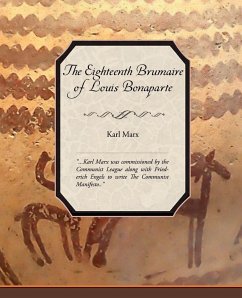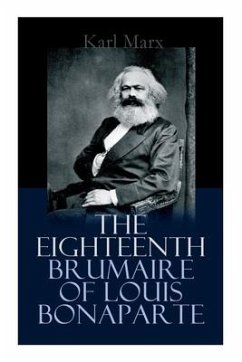
The Eighteenth Brumaire of Louis Bonaparte
Versandkostenfrei!
Versandfertig in 1-2 Wochen
13,99 €
inkl. MwSt.

PAYBACK Punkte
7 °P sammeln!
Considered one of Marx¿s most profound monographs and a brilliant history of the proletariat, this 1852 essay¿which originally appeared in Die Revolution magazine¿is Marx¿s commentary on the 1851 French coup by Louis Bonaparte, nephew of Napoleon Bonaparte, overthrowing the constitution of 1848. Most famous as the source of Marx¿s dictum that history occurs twice, ¿the first time as tragedy, the second time as farce,¿ this work is better known to historians as a vital early discussion of the politics of fascism in the 20th century, which Bonaparte¿s coup anticipated. Students of Marx¿...
Considered one of Marx¿s most profound monographs and a brilliant history of the proletariat, this 1852 essay¿which originally appeared in Die Revolution magazine¿is Marx¿s commentary on the 1851 French coup by Louis Bonaparte, nephew of Napoleon Bonaparte, overthrowing the constitution of 1848. Most famous as the source of Marx¿s dictum that history occurs twice, ¿the first time as tragedy, the second time as farce,¿ this work is better known to historians as a vital early discussion of the politics of fascism in the 20th century, which Bonaparte¿s coup anticipated. Students of Marx¿s philosophy and readers in modern political movements will find this an enlightening read. Prussian philosopher KARL MARX (1818-1883) was a social scientist, historian, and political revolutionary. He is indisputably the most influential socialist thinker to emerge in the 19th century. Although scholars largely ignored him in his own lifetime, his social, economic, and political ideas gained rapid acceptance in the socialist movement after his death.













